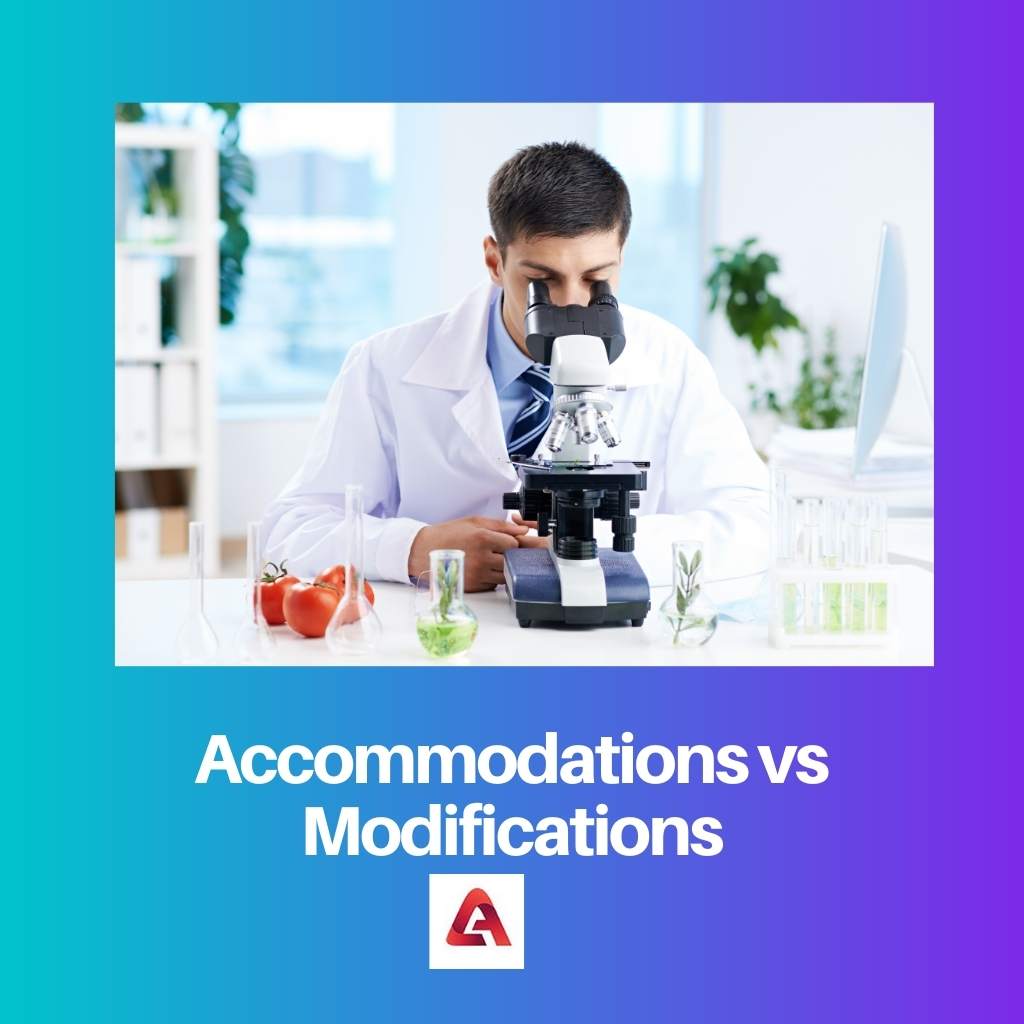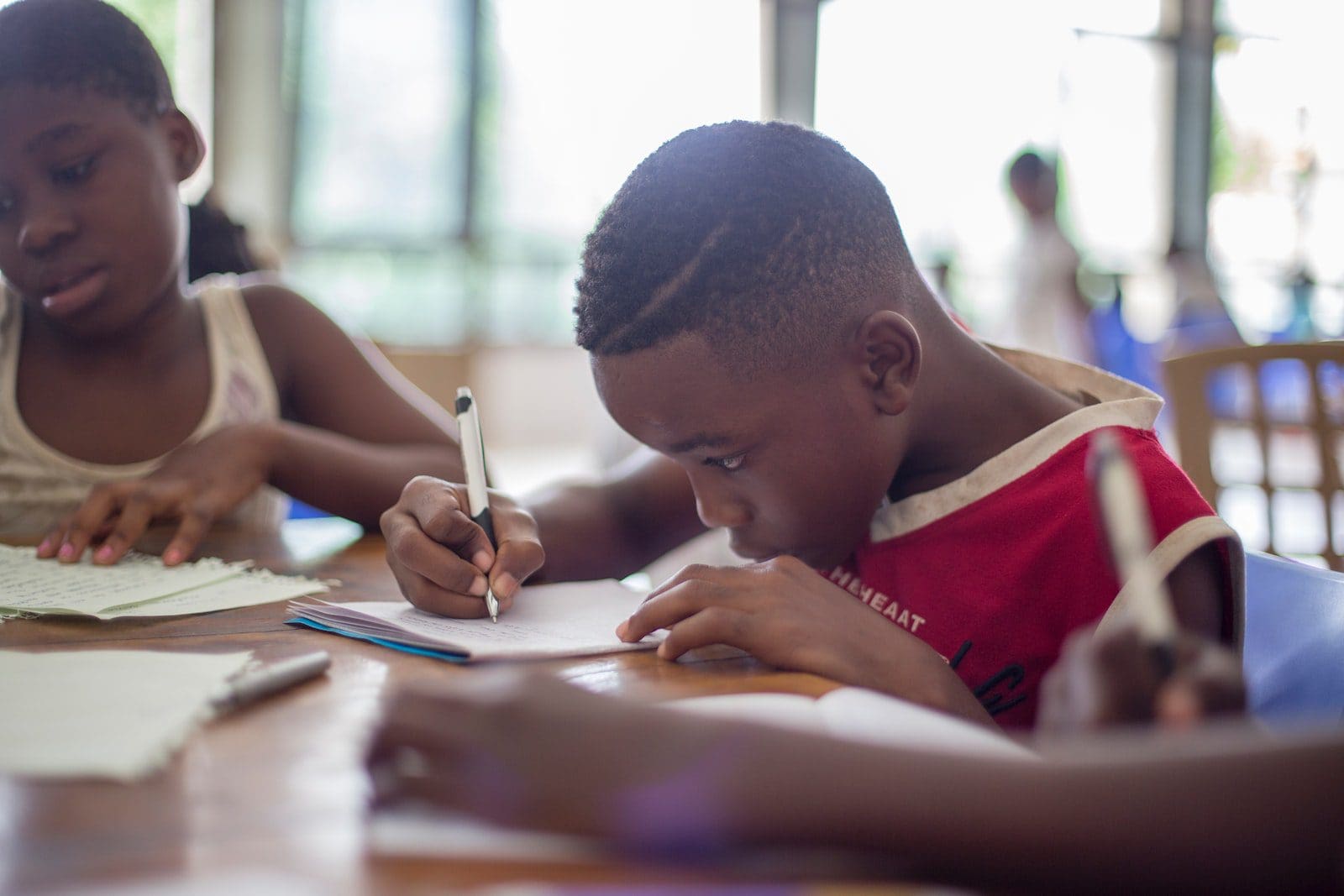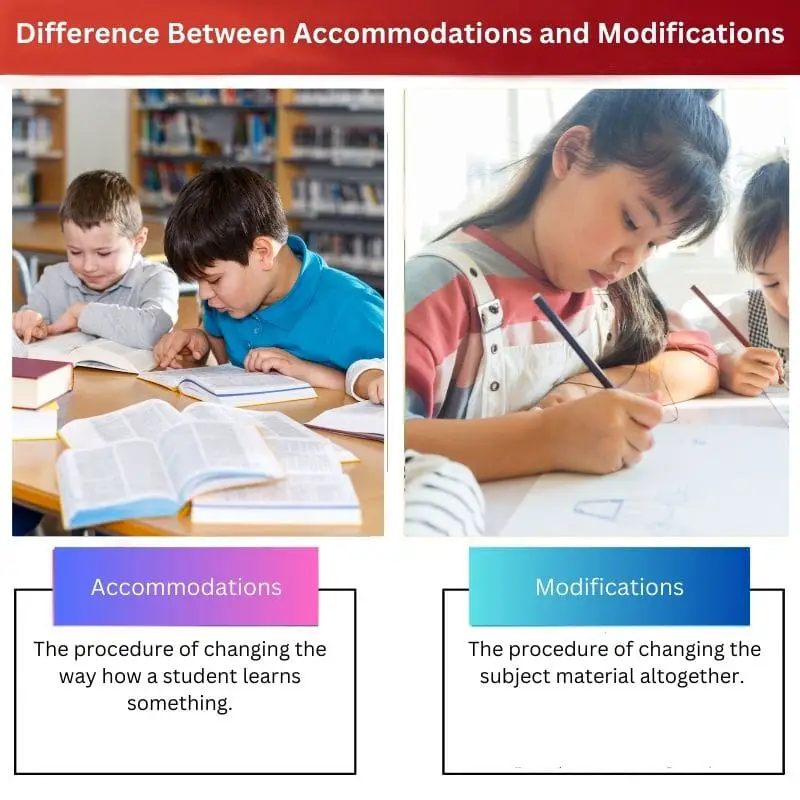Accommodations and Modifications are the terms used with people with disabilities or who are gifted. They are heard by students while studying.
They have used the ways that help the person succeed. In layperson’s terms, they are some procedures followed by the teacher and the student, making studying easier for the person.
Key Takeaways
- Accommodations are adjustments made to help individuals with disabilities access the same opportunities as non-disabled individuals. At the same time, modifications are changes made to the content or curriculum to meet the needs of individuals with disabilities.
- Accommodations may include things like wheelchair ramps, sign language interpreters, or extended time for tests, while modifications may involve simplified assignments or alternative assessments.
- Accommodations are intended to level the playing field, while modifications may alter the content or standard of learning.
Accommodations vs Modifications
Accommodations involve altering the environment or teaching strategies to help a student access the curriculum, such as allowing the use of assistive technology. Modifications involve changing the curriculum itself, such as simplifying assignments or reducing the number of questions on a test.

Accommodations mean supporting a student to learn the same curriculum as the rest of the class. For example: When a student is given extra time to complete a task or an exam compared to others as they are gifted.
Modifications mean changing the process of making a particular person learn. The things in the curriculum are changed.
Comparison Table
| Parameters of Comparison | Accommodations | Modifications |
|---|---|---|
| Definition | The procedure of changing the way how a student learns something. | The procedure of changing the subject material altogether. |
| Grading | The grades are marked according to the answers written. | The child’s limit considers the grades. |
| Study Material changes | There are no specific changes in Accommodation. The person learns the same amount of knowledge. | In a Modification, the student will get less work or study material to learn. |
| Extracurricular activities | Classes like Physical Education, music, and more give extra time to students to complete an activity. | In these special classes, the student won’t have to do the task, or the amount of work can be reduced to be completed by the child. |
| Examples | Extra time granted to students in a test, Sign language interpreter for people who are deaf, etc. | Different question papers for the student, alternative project homework for the disabled, etc. |
What are Accommodations?
Accommodation is a process used by teachers of institutions to make the learning procedure of the student easier. They are used when the person suffers from any disorder or disability that makes it difficult for an individual to hold off on the study material, whether written or physical.
In it, the student learns the same thing, reads the same book and does the same activity as others but with a bit of help or extra time allowed by the teachers.

What are Modifications?
Modifications are the changes in the process of learning a student’s subject. The teachers apply this for their students who are suffering in getting the knowledge together because of a condition or disability.
Modifications are applied accordingly. They are different from person to person and are prescribed by looking into the situation and the severity of the problem of the student.

Main Differences Between Accommodations and Modifications
- Modifications are more accessible than Accommodations as the workload gets less in the Modification Process. Still, since the number of work materials is the same in Accommodation, the student does the same thing compared to other students, just in a different way or with extra time.
- The system while grading a paper is the same as the Accommodation method. The student may get extra time to finish the paper but not extra marks.


This article effectively clarifies these often-misunderstood concepts and will certainly serve to benefit both educators and students.
This is an enlightening discussion of Accommodations and Modifications. It brings a level of clarity that is absent in many discussions on inclusive education.
Absolutely. The article’s clarity will be a great benefit to educators navigating the challenges of diverse learning needs.
The distinction drawn between Accommodations and Modifications is articulated exceptionally well. A valuable resource.
The intellectual depth of the article is truly commendable. It’s a significant addition to the discussion of inclusive education.
I couldn’t agree more. The educational value provided is highly significant.
The nuanced explanations given will help many understand the nuances of Accommodations and Modifications in education. A truly insightful read.
Indeed, the article’s contribution to the understanding of these concepts should not be underestimated.
Precisely. The detailed nature of the content makes it a valuable addition to the resources available for teachers.
I appreciate the detailed explanation that has been provided here about Accommodations and Modifications. It’s highly informative and educational.
Absolutely, the clarity of the concepts is commendable and would be beneficial for anyone involved in the education system.
This is a comprehensive and insightful explanation of the concepts of Accommodations and Modifications. Every teacher should have a clear understanding of this.
I couldn’t agree more. Inclusive education depends on the teacher’s ability and willingness to be flexible in their approach.
I feel that the clear distinction made between Accommodations and Modifications is vital for educators to appreciate when supporting students with diverse needs.
The comprehensive nature of this article is a real asset to teachers and students alike. It’s a valuable resource.
Yes, the specific examples provided in the article really solidify the understanding of these important concepts.
The article offers an in-depth look at an important topic that is misunderstood. I appreciate the value of this informative piece.
Absolutely, the depth of insight provided here is truly commendable.
This is a valuable resource for educators looking to enhance their understanding of Accommodations and Modifications. It will certainly contribute to more effective teaching practices.
Agreed, the significance of these concepts in the realm of inclusive education cannot be overstated.
The practical examples provided make the content easily applicable in educational settings. It’s a great reference.
The content here offers much-needed clarity on the differences between Accommodations and Modifications. It’s an excellent educational resource.
Certainly, the detailed manner in which the concepts are explained makes this a valuable reference for educators.